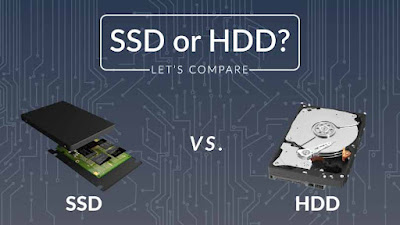SSD vs HDD - Which is Better & What's the Difference?
What's the difference between an SSD and an HDD, and which should you buy?
Can the outdated HDD storage technology still be justified? Absolutely, there is.
HDD vs. SSD
The HDD (Hard Disc Drive), the industry standard, and the SSD (Solid State Drive) continue to compete for data storage. However, at first glance, it would appear that HDDs are no longer a viable option because the newer, quicker SSDs are far better suited for every work than HDDs.
Even in a contemporary environment, there are many situations where HDDs are a perfect fit, despite how simple it is to pitch the benefits of SDDs.
Can the outdated HDD storage technology still be justified? Absolutely, there is.
HDD vs. SSD
The HDD (Hard Disc Drive), the industry standard, and the SSD (Solid State Drive) continue to compete for data storage. However, at first glance, it would appear that HDDs are no longer a viable option because the newer, quicker SSDs are far better suited for every work than HDDs.
Even in a contemporary environment, there are many situations where HDDs are a perfect fit, despite how simple it is to pitch the benefits of SDDs.
Not only are HDDs and SSDs utilised for storage within PCs and laptops, but they are also employed in other devices. Storage drives can be found in servers, external storage containers, and NAS devices.
Additionally, by selecting the proper storage for the job, you can prolong the time between upgrades, which saves money and lengthens the lifespan of a gadget.
SSD
Data is kept on flash memory chips in storage devices like SSDs. Because of their quick read and write speeds, these processors make SSDs a quick data storage option.
An SSD does not have any moving elements, thus it operates quietly and is not vulnerable to vibration and impact damage.
HDD
As opposed to an SSD, which stores its data on flash memory chips, HDDs store their information on rotating discs known as platters. HDDs are substantially less expensive and have much larger capacities—up to 22TB—than SSDs, although not being as quick.
Hard drives are less durable than SSDs because to the rotating platters and other moving parts, which makes them more susceptible to damage.
Impact and vibration-resistant
Data is at risk from vibration and collisions due to spinning discs.
If you want to buy an SSD, you should get a 2.5-inch SSD and an M.2 SSD.
1. You seek fastest speed.
An SSD can outperform even the fastest HDD if you're searching for quick boot times or want to load games or applications with ease. There is just no comparison to be made because the slowest SSD is easily 10 times faster than the quickest HDD. An SSD is necessary if you want speed!
2. You work with large files.
An HDD can easily and quickly become unresponsive while handling large files, such as large video files. Professionals can load and save large files much more easily thanks to SSDs, which speeds up workflow and makes your desktop or laptop appear to be much faster. SSDs will help expedite backups, so you can spend less time securing your data.
3. You require tough dependability.
SSDs are much more durable and resistant to vibrations and impacts than HDDs are since they have no moving bits. SSDs are so durable that you can figuratively throw them in your backpack without worrying about them getting broken and losing your data. SSDs are the ideal option for desktop computers and laptops as well as portable external storage devices.
If... the spinning platters within an HDD are where the data is kept, then you should get one.
The data is stored on rotating platters inside an HDD.
1. You require a large amount of storage.
Large HDDs are less expensive than SSDs. As a result, you gain enormous storage space for large video files, backups, and programmes and games. HDDs are your best option if you're trying to maximise your storage space for the money.
2. You want to reduce your expenses.
Want to get the most value for your money? Choose an HDD. A 2TB HDD will cost you less than and even while the cost of SSDs is falling quickly, you'd be lucky to obtain one with half that amount of storage for the same price. While 2TB of storage is typically sufficient for users, if it isn't, there are various options to get another 2TB drive.
3. You back it up with it.
Due to their enormous capacity and affordable price per gigabyte, HDDs are the best for backups. It doesn't make sense to use SSDs for backups unless you have no other choice and you require the fastest backup possible. HDDs will provide you with all the storage space you require, whether you use a single HDD in an external enclosure, numerous drives in an external storage box, or a NAS system. Additionally, since backup devices aren't utilised frequently, HDDs will provide a high level of reliability.
Check below links



Comments
Post a Comment